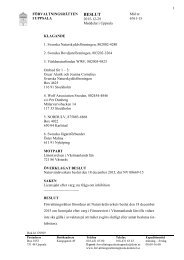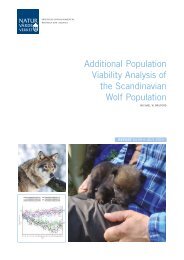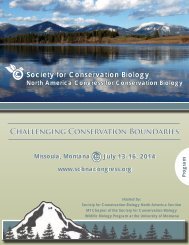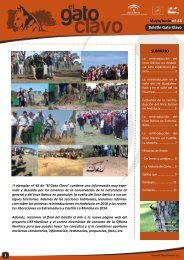1oC3Dbk
1oC3Dbk
1oC3Dbk
Create successful ePaper yourself
Turn your PDF publications into a flip-book with our unique Google optimized e-Paper software.
of observations within these states.<br />
The VSG would like to thank the Mohammed Bin Zayed<br />
Species Conservation Fund for their generous donation<br />
towards the conservation of the Black-headed Bushmaster. If<br />
you are interested in participating in the VSG, please contact<br />
the Regional Coordinator in your area. Contact information can<br />
be found here.<br />
Christopher L. Jenkins<br />
Chair, Viper Specialist Group<br />
Vulture Specialist Group<br />
The Vulture Specialist Group (VSG) was formally established in<br />
April 2011 and aims to advocate and create awareness of the<br />
plight of these birds and to help coordinate conservation<br />
activities to their benefit. The VSG currently has around 80<br />
members, spread over five continents and includes expertise on<br />
both Old and New World vulture species. In addition to the two<br />
Co-Chairs, regional representatives from Europe and Africa<br />
have been appointed to serve on the Steering Committee of the<br />
VSG. The journal Vulture News is the official mouthpiece of the<br />
VSG and is currently edited by Campbell Murn.<br />
In Africa, the mass-poisoning of vultures in southern Africa<br />
during 2013 was a great cause for concern with more than<br />
1,500 birds known to have been killed in the second half of the<br />
year alone. Of even greater concern is the clear link that exists<br />
between these poisonings and the poaching of elephants. The<br />
African Region of the VSG is planning a Summit, which will<br />
take place in Namibia in May 2014; involving key-players from<br />
the region. The objective is to implement plans to more<br />
effectively manage and contain such incidents and to improve<br />
the high level enforcement of legislation across the region.<br />
In Asia, the results of large scale road-transect and other<br />
surveys were published; showing clear signs that declines in<br />
vulture populations have slowed and may even have stopped<br />
in some areas, and that this is clearly linked to the reduction in<br />
diclofenac levels in cattle carcasses. However, even though<br />
there’s a clear reduction in the use of diclofenac, it remains a<br />
serious threat due to the illegal veterinary use of human<br />
formulations of the drug; and worryingly, there are other legal<br />
veterinary drugs being used that are similarly toxic to vultures.<br />
The Saving Asia’s Vultures from Extinction (SAVE) consortium<br />
has grown in stature, and continues to advocate for the<br />
cessation of large ‘multi-dose’ vials of human formulations,<br />
which are the main and cheap source of the drug used by<br />
vets. Both SAVE and the newly established Government-led<br />
Regional Steering Committee (RSC) which is chaired by IUCN,<br />
met this year and they are working towards the implementation<br />
of a ban on the use of multi-dose human diclofenac vials, as<br />
well as establishing a vulture safety-testing mechanism for<br />
other veterinary drugs entering the market. Both of these<br />
issues require concerted efforts to ensure they happen quickly,<br />
and further work will be needed to make sure that unsafe<br />
drugs are not licensed for veterinary use. Also in 2013, National<br />
Vulture Recovery Committees were established for each of the<br />
four South Asian countries covered by the RSC, and at least<br />
two of these have already met.<br />
The VSG also supports the International Vulture Awareness<br />
Day which was established in 2009 and has become an annual<br />
event observed in 57 countries and by 163 organisations<br />
globally in 2013. The event aims to promote awareness and to<br />
educate the public about the plight and environmental value of<br />
vultures and the pressing need to conserve them.<br />
Andre Botha and Chris Bowden<br />
Co-chairs, Vulture Specialist Group<br />
WCPA/SSC Joint Task Force on Biodiversity and<br />
Protected Areas<br />
The WCPA/SSC Joint Task Force on Biodiversity and<br />
Protected Areas has two main objectives. Objective 1 is<br />
focused on understanding the factors that make protected<br />
areas successful in conserving biodiversity. For 2013, the Task<br />
Force has completed the following:<br />
• The global analysis of the best predictors of success for<br />
protected areas (PA) is complete. We collated 1902<br />
population abundance time series from 447 protected areas<br />
and calculated population changes as a metric of PA<br />
effectiveness. We used linear mixed effect models to explore<br />
correlates of population change in PAs, comparing a wide<br />
range of management, ecological, social and economic<br />
predictor variables. The paper is drafted and will be<br />
submitted to a major journal.<br />
• Task Force member Megan Barnes completed her PhD at<br />
the University of Queensland, working directly on the above<br />
project.<br />
• A Task Force authored, peer-reviewed paper was published<br />
in Biological Conservation titled “Effectiveness of terrestrial<br />
protected areas in reducing habitat loss and population<br />
declines”.<br />
• Task Force Member Jonas Geldmann submitted his PhD at<br />
the University of Copenhagen. He has worked on correlating<br />
The poisoning of Vultures in South Africa has devastated populations of<br />
Cape Griffon Vulture and African White-backed Vulture, as this photograph<br />
shows from an incident in July 2013. © The Endangered Wildlife Trust<br />
KBA Governance workshop, Nov 2013, Brasilia, Brazil.<br />
Specialist Groups, Task Forces and Red List Authorities<br />
91






